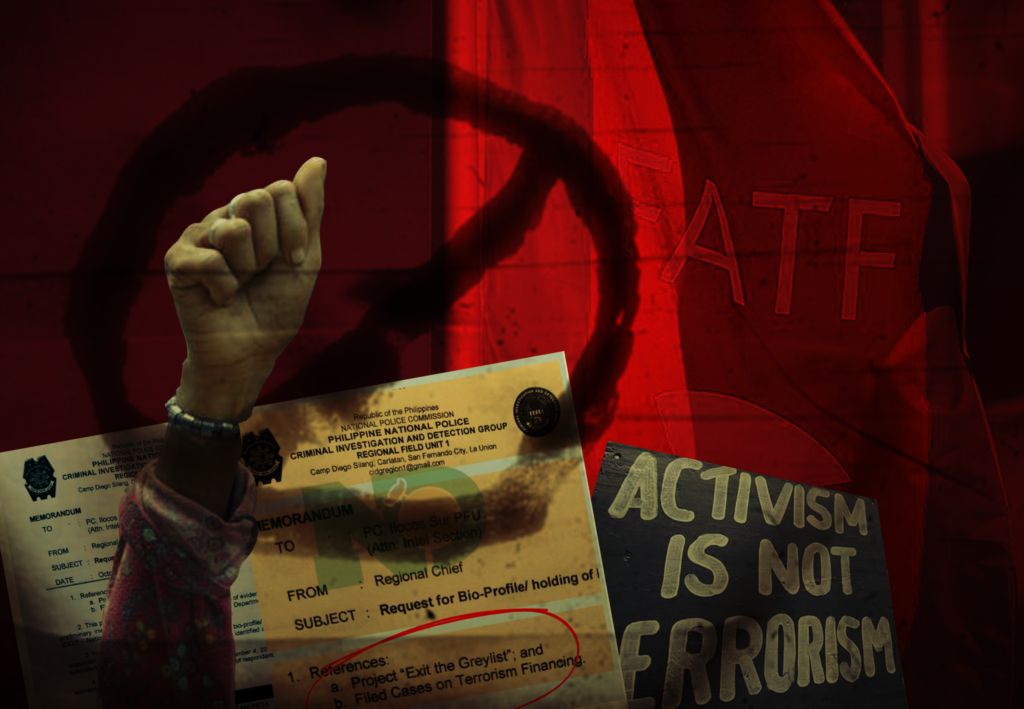PCIJ and Rappler reveal the hidden price of FATF Exit

CHEERS TO the Philippine Center for Investigative Journalism (PCIJ) and Rappler for their reports on the removal of the Philippines from the Financial Action Task Force’s (FATF) ‘grey list,’ revealing the connection to human rights concerns. Other media outlets focused on economic and financial implications. PCIJ and Rappler exposed how the government’s compliance efforts were also linked to a crackdown on civil society and human rights defenders.
On February 21, 2025, the Philippines was officially removed from the FATF ‘grey list,’ a designation for countries under increased monitoring for financial crimes. This was widely celebrated as an achievement that enhanced the country’s financial credibility. However, PCIJ and Rappler uncovered evidence that the government’s compliance efforts may have also led government agencies to intensify efforts to crack down on activists and civil society organizations.
‘Project Exit the Greylist’ and the Crackdown on Activists
Carmela Fonbuena of PCIJ obtained a memorandum from the Criminal Investigation and Detection Group (CIDG) in La Union province that detailed an initiative called ‘Project Exit the Greylist.’ The document explicitly linked the FATF compliance process to at least one terrorist financing case filed against an activist. The CIDG memo noted that the FATF-related investigation led to the arrest of a development worker accused of supporting terrorist activities, despite a lack of evidence to support the charge.
National Union of Peoples’ Lawyers (NUPL) president Ephraim Cortez said that the government used FATF requirements as a pretext to file terrorism financing charges against civil society organizations (CSOs). The Defend NGO Network reported terrorism-related charges filed against 59 development workers from 19 NGOs; while Karapatan’s records show 166 individuals accused under the Anti-Terrorism Act (ATA)—many allegedly tied to communist rebels or designated terrorists.
Cortez said, “It’s a double-edged sword. This is what they want to stifle—dissent and what they call legal fronts. Terrorism laws, both the Terrorism Financing Prevention and Suppression Act of 2012 (TFPSA) and the ATA, are now being weaponized for this purpose. It is like hitting two birds with one stone, they get to comply with the FATF and neutralize the mass movement and development NGOs. . .”.
Fonbuena cited a study by the Royal United Services Institute (RUSI), which warned that FATF mandates could be misused by authoritarian regimes. Stephen Reimer of RUSI cautioned that under pressure to meet FATF expectations, governments may pursue cases of suspected terrorism financing based on weak evidence.
The report then detailed the cases of Frenchie Mae Cumpio and Myrna Zapanta—both arrested on dubious terrorism financing charges. Cumpio, a journalist detained since 2020, and Zapanta, a 66-year-old development worker, exemplify how the government has stretched anti-terror and financial laws to criminalize civil society actors without solid evidence.
The report was produced in partnership with Northern Dispatch.
A Surge in Terror Financing Complaints Under Marcos
Meanwhile, Lian Buan of Rappler highlighted a 371% increase in terror financing complaints filed in 2024 under the Marcos administration, a dramatic surge that suggests an aggressive push to meet FATF benchmarks.
Buan’s report was comprehensive: It established the historical context of the current situation, stated the mandate of FATF, and outlined its role in preventing financial crimes; described how its standards have been weaponized against human rights defenders, citing studies from 2019 and 2021 that documented how governments worldwide have used FATF compliance as a pretext for suppressing dissent.
Buan also noted the suspicious timing of these cases and tracked the accelerated pace of filing terrorism financing charges in time for a possible FATF exit. Human Rights Watch (HRW) told Rappler that many of these prosecutions appeared more aligned with meeting FATF requirements than addressing genuine security threats, warning that this could lead to the criminalization of legitimate humanitarian work and activism.
Additionally, Buan raised concerns about the violation of due process, as many accused individuals had little legal recourse to deal with the accusation of being labeled as security threats.
The reports of PCIJ and Rappler revealed the disproportionate impact of FATF compliance requirements on lawyers, development workers, and human rights defenders.
Most of the coverage of the country’s exit from the ‘grey list’ framed the milestone in the most positive light, a clear economic win. These reports were set apart by also calling attention to the hidden cost and the burden that activists and civil organizations may be called to bear in the process.
Leave a Reply